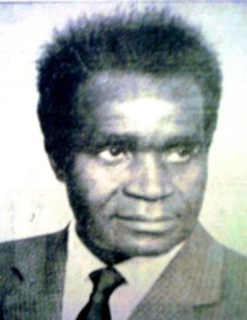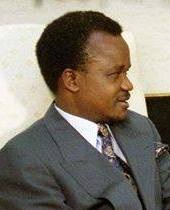Related Research Articles

The politics of Zambia takes place in a framework of a presidential representative democratic republic,whereby the president of Zambia is head of state,head of government and leader of a multi-party system. Executive power is exercised by the government,while legislative power is vested in both the government and parliament. Formerly Northern Rhodesia,Zambia became a republic immediately upon attaining independence in October 1964.

The Movement for Multi-party Democracy (MMD) also known as New Hope MMD is a political party in Zambia. Originally formed to oust the previous government,MMD controlled an absolute majority in parliament between 1991 and 2001,when its past leader,Frederick Chiluba was President of Zambia. Its election into power in 1991 ended the 27-year rule of President Kenneth Kaunda and his United National Independence Party (UNIP). It remained the dominant party within Zambian politics until the general elections of September 2011.

The president of Zambia is the head of state and the head of government of Zambia. The office was first held by Kenneth Kaunda following independence in 1964. Since 1991,when Kaunda left the presidency,the office has been held by seven others:Frederick Chiluba,Levy Mwanawasa,Rupiah Banda,Michael Sata,Edgar Lungu and the current president Hakainde Hichilema,who won the 2021 presidential election. In addition,acting president Guy Scott served in an interim capacity after the death of President Michael Sata.

The prime minister of Zambia was the head of government of Zambia. From 1973 to 1975,Mainza Chona was the first person to hold the position following independence from the United Kingdom.

The United National Independence Party (UNIP) is a political party in Zambia. It governed the country from 1964 to 1991 under the socialist presidency of Kenneth Kaunda,and was the sole legal party in the country between 1973 and 1990. On 4 April 2021,Bishop Trevor Mwamba was elected President of UNIP.

Elections in Zambia take place within the framework of a multi-party democracy and a presidential system. The President and National Assembly are simultaneously elected for five-year terms.
The Zambian National Women's Lobby is a Zambian organization whose mission is to "bridge the gender gap in political decision making by advocating for increased women's participation and representation". The Lobby was created following Zambia's transition from a one-party state to a multi-party democracy in 1990. At the time,only seven women served in the Parliament of Zambia out of 150 seats,and only three women served on the Central Committee,the equivalent of today's Presidential Cabinet. The official motto of ZNWL is "WIZER" which stands for "Women in Zambia for Equality Representation".

The National Assembly is Zambia's unicameral legislative body. Between 1972 and 1990,Zambia was a one-party state with the United National Independence Party (UNIP) as the sole legal party.
Mainza Mathias Chona was a Zambian politician and diplomat who served as the third vice-president of Zambia from 1970 to 1973 and Prime Minister on two occasions:from 25 August 1973 to 27 May 1975 and from 20 July 1977 to 15 June 1978.

General elections were held in Northern Rhodesia on 20 and 21 January 1964. There were two voter rolls for the Legislative Council,a main roll that elected 65 seats,and a reserved roll that elected 10. Africans elected the main roll,whilst Europeans elected the reserve roll. Other ethnicities were allowed to choose which roll to be part of. The United National Independence Party won the elections,taking 55 of the common roll seats. Its leader,Kenneth Kaunda became Prime Minister,leading the country to independence in October that year,at which point he became President. Voter turnout was 94.8% for the main roll and 74.1% for the reserved roll.

General elections were held in Zambia on 19 December 1968 to elect the National Assembly and President. The first post-independence polls saw incumbent Kenneth Kaunda retain his post as president,whilst his United National Independence Party,the only party to field candidates in all 105 constituencies,won 81 of the 105 seats in the National Assembly. Voter turnout was 82.5% in the parliamentary election,but 87.1% in the presidential election.

General elections were held in Zambia on 27 October 1983. At the time,the country was a one-party state,with the United National Independence Party (UNIP) as the only legally permitted party. Its leader,Kenneth Kaunda was automatically re-elected for a fifth term as President,and was confirmed in office with over 95% of the vote. UNIP also won all 125 seats in the National Assembly. Voter turnout was around 63% in the parliamentary election,but 65.5% in the presidential election.

General elections were held in Zambia on 31 October 1991 to elect a President and National Assembly. They were the first multi-party elections since 1968,and only the second multi-party elections since independence in 1964. The United National Independence Party (UNIP),which had led the country since independence,was comprehensively beaten by the Movement for Multi-Party Democracy (MMD). Kenneth Kaunda,who had been president since independence,was defeated in a landslide by MMD challenger Frederick Chiluba in the presidential elections,whilst the MMD won 125 of the 150 elected seats in the expanded National Assembly. Voter turnout was 45%.

General elections were held in Zambia on 18 November 1996 to elect a President and National Assembly. They were boycotted by the main opposition party,the United National Independence Party,together with five other allied parties,following changes to the constitution which they failed to have reversed following a court challenge. The changes imposed a two-term limit on the presidency,required presidential candidates to be born to two Zambian citizens by birth or descent,and required National Assembly candidates to give up their chieftaincy. UNIP believed these changes were specifically aimed at their longtime leader,Kenneth Kaunda,whose parents were Malawian and had previously served as the country's first president from 1964 to 1991. The changes would have also excluded UNIP's vice president,a chief. Subsequently,the ruling Movement for Multi-Party Democracy won a comfortable victory in both elections,taking 131 of the 150 elected seats in the National Assembly,and its candidate,Frederick Chiluba,winning 73% of the vote in the presidential election.
Amon Rex Natala was a Zambian politician. He served as Member of the National Assembly for Bweengwa from 1978 until 1988.
Sikota Wina is a Zambian former politician. He was a member of the Legislative Council and the National Assembly and the country's first Minister of Health. He also held the posts of Minister for Local Government and Minister of Information,Broadcasting and Tourism.
Lucy Banda-Sichone (1954–1998) was a Zambian civil rights activist who played a pivotal role in representing the Zambian people who had their rights violated by the State at the time. Born and raised in Zambia's second largest city,Kitwe,she became the first Zambian woman to receive a Rhodes Scholarship and also the first woman to have her portrait displayed on the walls of Oxford University’s prestigious Rhodes House.
Nakatindi Yeta Nganga (1922–1972) was a Lozi aristocrat and Zambian politician. Jointly one of the first women elected to the National Assembly,she was also the country's first female junior minister.
Margret Safatiya Mbeba was a Zambian politician. She served as a member of the National Assembly for Kazimuli from 1964 to 1968 and was jointly one of the first elected female MPs in Zambia.
Monica Nanyangwe Chintu was a Zambian politician,one of Zambia's first female politicians.
References
- ↑ Interdesciplinary Conference on Gender and Colonialism, University of the Western Cape, 1997, Volume 2, p106
- ↑ Mbuyo Nalumango and Monde Sifuniso (1998) Woman power in politics, Zambia Women Writers Association, p48
- ↑ Official verbatim report of the debates of the second session of the second National Assembly, Volume 2, Issue 2, Part 1, p2185
- ↑ Sub-Saharan Africa Report, Issues 2457–2463, p22